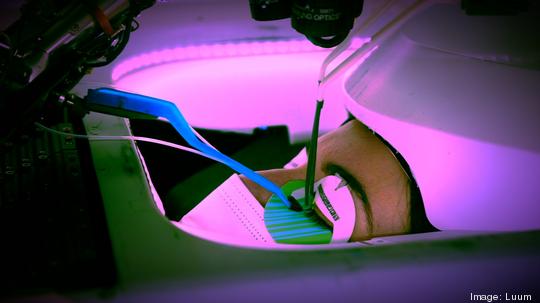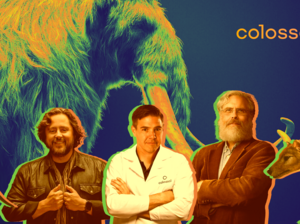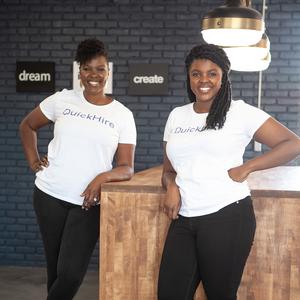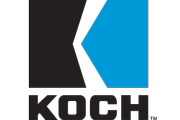
Welcome to The National Beat powered by American Inno, a weekly look at the startup fundings, profiles, analysis and other news you need to know from 40+ cities across the U.S. Want more stories like this in your inbox? Sign up for our future national newsletter from American Inno.
In today's National Beat, we're bringing you the inside story of a modern day mood ring startup in Austin, a new NFT firm in Tampa co-founded by Michael Vick, an inside look at Meta's office in Pittsburgh that's creating digital avatars by the thousands, and a robot backed by Ulta Beauty that wants to change how you put on eyelash extensions.
Let's drop a Beat...
The Big One: A modern-day mood ring from the co-founder of Tinder raises $60M
The origins of the mood ring date back to 1975, when two inventors from New York created a device that could supposedly change colors based on the emotional state of the wearer. The ring was designed to turn violet when happy, blue when relaxed, or brown when anxious.
Mood rings, while popular, proved to be more gimmick than accurate indicators of your true mood. But a new modern mood ring from an Austin startup aims to accurately measure your stress level, and it's backed with millions in funding.
Happy Health, led by Tinder co-founder Sean Rad and Austin-based Dustin Freckleton, has created the Happy Ring, a high tech ring that detects stress and helps the wearer reduce it. The startup recently disclosed it raised $60 million in a Series A round led by ARCH Venture Partners.
Entrepreneurs Freckleton and Rad noticed they were absorbing a lot of stress from work, so they collaborated in making a ring that measures stress levels and offers user ideas to unwind. The two met when Rad invested in Freckleton's previous company, LVL, and became friends through the process.
The Happy Ring monitors stress levels on a scale of 0 to 100 then gives suggestions on how to de-stress, such as meditation or breathing exercises, Freckleton told Austin Inno. The user will see which techniques are most helpful through biofeedback.
Happy Health recently opened the waitlist for its ring and plans to ship the product out in the coming months.
Startups to Watch
- Portland apparel startup Oros is headed to space. The company, which makes jackets insulated using technology used in astronaut suits and on spacecraft, will be used by Blue Origin in its NS-23 rocket launch on Aug. 31. The purpose of the launch is to test if human cells can withstand temperatures in space that can drop to negative 450 degrees Fahrenheit, according to Portland Inno. Oros’ Solarcore insulation technology will be used to prolong the life of the batteries that will keep the cells at a livable temperature. Blue Origin is the aerospace manufacturer owned by Amazon founder Jeff Bezos.
- Michael Vick is getting into the NFT business. The former NFL quarterback has joined Trevor Paladino to create Tampa-based FanField, a startup that lets users buy NFTs that give them access to experiences with athletes. FanField's tiered system offers higher-valued NFTs that provide things like private meet-and-greets, and lower tiers that give access to things like autographed merchandise and digital trading cards. The startup told Tampa Bay Inno that the platform could be the next iteration of collecting trading cards.
- Houston startup Tradeblock believes it's created a better way for sneakerheads to trade shoes online, and it's raised $8.9 million in seed funding to grow. Tradeblock has built a barter-based trading platform for shoe collectors, and since 2020 has facilitated trades for over 250,000 users. More than 1 million shoes have been listed in virtual closets on the Tradeblock marketplace this year, the firm told Houston Inno.
- Atlanta startup Kabila is building the Tinder for startup founders. Kabila allows entrepreneurs from around the world with shared interests to match with each other to make their ideas into startups. The startup is developing its matching platform and has 150 members that attend its workshops and events, the company told Atlanta Inno. it's currently participating in the three-month long Techstars Austin accelerator program.
- Charlotte startup Petfolk is creating a network of modern veterinary practices, and it recently raised $40 million from a handful of country music superstars and other celebrities. The startup puts a large emphasis on thoughtful design, like eliminating waiting rooms where anxious pets might be forced to interact. Its investors include Miranda Lambert, Dierks Bentley, Midland’s Mark Wystrach and Cameron Duddy, Jimmie Johnson, Erik Jones and Danica Patrick. The funding comes as it aims to open 20 facilities in five states in the Southeast next year.
- Former Seattle Seahawks wide receiver Doug Baldwin is the CEO of health and fitness startup Ventrk, a Seattle startup that recently announced $1 million in funding. Ventrk makes two apps, TheraCentric and TrainCentric, aimed at helping users with their health and fitness. TheraCentric allows physical therapists to assign personalized programs with videos to patients. Ventrk says the app delivers real-time data. TrainCentric, meanwhile, focuses on exercise, allowing users to count reps, sets and rest time. Ventrk says the app offers custom workouts and more than 40 exercises.
- A Baltimore startup is working with the White House to help get part of the $1.2 trillion federal infrastructure package into the hands of underserved communities. XCell is one of the five teams working with the White House as part of the 2022 "Opportunity Project," an initiative that began in 2016 to use federal and local data to tackle issues of inequality. XCell makes it easier for under-resourced communities to apply and win grants, the company told Maryland Inno.
- A St. Louis startup thinks video can help companies create more authentic job postings. Largely, a product developed by startup Thumbraise, allows company managers, as well as rank-and-file employees, to record videos that speak to topics regarding the business. The software is being used by companies like Anheuser-Busch and Medical Transportation Management.
Office envy: Inside Meta's Pittsburgh offices where virtual reality shapes its future
As Meta's metaverse vision takes shape, the tech giant's Pittsburgh office is working to create the avatars you'll use to navigate this new virtual world. Some 300 Meta employees in Pittsburgh, are tasked with creating avatars using an array of custom-built video and audio capturing systems. The tech was designed as part of Meta's Great Human Survey, an initiative started back in 2017 that looks to compile digital transformations of 10,000 people and has already transformed over 200 people in and around the Pittsburgh area for placement into Meta's metaverse.
The company recently offered updates on this progress and other metaverse-related feats to Pittsburgh Inno, which takes readers inside the secretive office space.
Trendspotting: What does crypto's collapse mean for San Francisco?
Just six months ago, the cryptocurrency industry was riding high as celebrity endorsers from Matt Damon to Tom Brady to Reese Witherspoon were hawking all manner of crypto vehicles to millions of eager retail investors. Since then, prices have crashed in a seasonal cataclysm widely dubbed the “crypto winter.”
From the ashes of this boom-and-bust cycle, the crypto industry hopes to gear up for a new era. But whether San Francisco will continue to play a leading role is — like the future of crypto itself — clouded by uncertainty, Bay Area Inno reports.
As the city struggles to regain its vitality after the pandemic and struggles with homelessness, perceptions of rampant crime and high costs, some crypto innovators feel its time has come and gone. Last year, San Francisco lost the nation’s largest crypto company, the digital asset exchange Coinbase. The company closed its downtown office and declared its headquarters as “global." A year later, another large crypto exchange, Kraken, left the city on more contentious terms, with its CEO Jesse Powell citing crime, homelessness and the leniency of the city’s former DA Chesa Boudin as reasons for the departure.
The departures come as other companies are moving to emerging crypto hubs like Austin and Miami.
Weird and Wired: Meet the eyelash extension robot
Applying false eyelashes is a delicate, manual process done either at home or by professional aestheticians. But Oakland startup Luum has created a robot to make the process faster and less labor intensive.
To use Luum's machine, lash extension artists load false lashes into the machine and prep a client's eyelids before the robot plays its part. Once a customer is under the machine and prepped, Luum's robot scans their eyelids to isolate each natural lash. It then selects a false eyelash with a "featherweight" wand, dips it in glue, places it in the correct spot and uses a blue light to dry it.
The startup has raised $15 million in seed funding from investors including Ulta Beauty.






